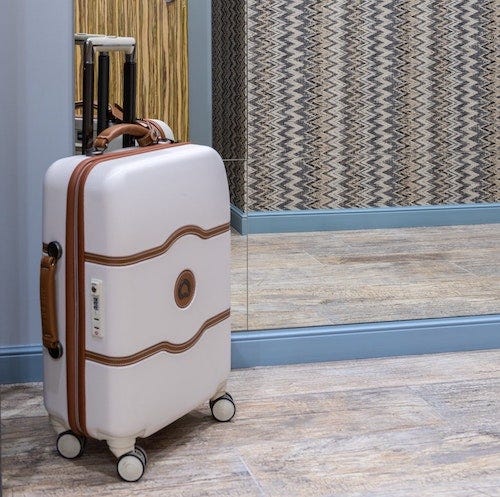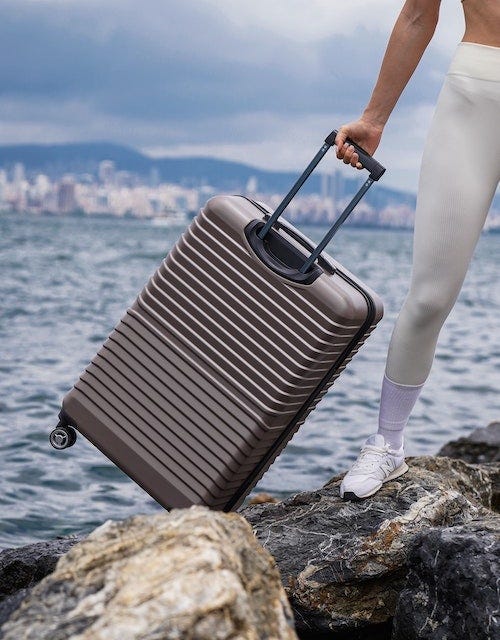I have an almost moral dislike for the four-wheeled suitcase. Bear with me here. Before 1972, luggage had no wheels. Then, Bernard Sadow patented this design with four small wheels and a strap:
By all accounts, this design wasn’t great and it didn’t become popular. Things changed in 1987 when a pilot for Northwest Airlines named Robert Plath took a suitcase and attached two large wheels and a long handle so could be tilted and rolled.
He first just sold these to flight crews, but everyone who saw them wanted one and soon he quit to start a luggage company. This design was so great that all the other luggage companies copied it and today economists debate why it wasn’t invented decades earlier. These were the good times.
In 2004 Samsonite introduced the four-wheeled suitcase. In these, each wheel spins on a caster so you can push the suitcase vertically without the grueling labor of holding it up.
These suitcases—pardon me—can go to hell.
Sure, they’re better in ideal circumstances. If you’re going over smooth flat concrete and your 4-wheeled suitcase is empty, then it’s effortless. Look at how happy this woman looks in this stock photo:
Fine. But if you face even the slightest adversity—gravel or cracks or grass or curbs or even just have heavy stuff in your suitcase—then the four-wheeled suitcase is vastly worse. Weirdly, there’s another image from the same photo set that seems designed to demonstrate this point:
You can’t roll that there, stop that.
Sometimes I wonder if there’s a flaw in my approach to life. Do other people not need to move their luggage over curbs and gravel? Do they spend their whole lives floating between liminal spaces in gleaming airports and conference centers and hotels, never intersecting with the grimy shambolic reality that I inhabit? Every time I’ve been forced to carry a 4-wheeled suitcase (blame the Dynomight biologist) it’s caused more trouble than it has saved.
Certainly, I see a lot of people on the street struggling to haul 4-wheeled suitcases over subway gratings, looking surprised when it doesn’t work. And I wonder: Is the choice between 4-wheeled and 2-wheeled suitcases archetypal of some broader category? Do we often err in choosing fancy fragile solutions that work best in ideal circumstances over simple rugged solutions that perform better in merciless reality? If we look for analogies, will we learn something?
Cars
A Jaguar has advantages. If you want to whisk between crumpet appointments in Bumbleshire, I imagine it provides a wonderful experience. But if you want to drive over rocks in the desert for years with minimal maintenance, you probably want something like more like a Toyota Hilux.
Hiking/Camping
There are many similar choices in camping equipment. If you’re camping in cold weather, you must insulate yourself from the ground so you don’t freeze to death. Many hikers use inflatable pads. These are comfortable, but I worry what happens if you get a leak on a cold night. The alternative is dumb closed-cell foam pads, which are bulky and less comfortable but light and cheap and extremely robust.
Similarly, for rain gear you can choose between thin materials with hydrophobic chemicals (light, breathable, fragile, raise polyfluoroalkyl levels in penguins) and dumb plastic layers (heavy, unbreathable, strong).
Or to purify water, you can either use a mechanical filter (fast, pleasant, doesn’t filter viruses, can break), or boil water (delightful when you’re thirsty on a hot day) or using chlorine dioxide tablets (takes four hours, tastes like a swimming pool).
Food
In theory, the healthiest diet ought to be something like Soylent: A mixture of ingredients optimized by science to be good for you. In reality, our civilization doesn’t know enough about nutrition to optimize things, so you’re surely much better off just eating a varied diet with lots of vegetables and avoiding processed foods and whatnot.
Drinking
Ancient Roman soldiers often carried a piece of sponge to use for drinking in lieu of a cup. The exact reasons they did this are a little murky, and hard to research because the internet is obsessed with ancient uses of sponges on sticks for other valuable purposes. But sponges are lighter, unbreakable, and convenient to combine with vinegar as a disinfectant. No one does this anymore.
Space pens
The story goes that NASA spent millions of dollars developing a pen that would work without gravity while the Soviets just used a pencil. So, a win for the “two-wheeled suitcase”?
Actually, no. In reality, both the US and USSR used pencils but were unhappy with them because they left bits of graphite floating around. The space pen was developed with private capital and once available both the US and USSR tested it and found it was great after which they bought them at a reasonable cost (something like $27 in 2023 dollars).
Dangerous People
Say it’s 3000BC and you live in a tribal band where someone committed murder. You could banish them, but maybe they’ll follow you or join up with your enemies. You could try to confine them in a giant pit, but what if they escape? The safe thing is to kill them. Today we have prisons.
Startups
One way to start a company is to come up with a brilliant business model or technology and keep it secret until you have a big launch for your product. That sounds good, but what if someone steals your idea? And how do you know anyone actually wants your product if you don’t test it in the real world? The alternative is to just build a good team and keep changing ideas until something takes off.
Fútbol
The traditional way to play soccer is to give people fixed roles (attacker, midfielder) train them to be good at those roles. In the 1970s the Dutch developed “total football” where players shift positions and rely much more on improvisation. While this was seen as revolutionary at the time and some recent teams use related fluid strategies like “tiki-taka”, it still isn’t the dominant strategy today.
Headphones
The high-tech way to deal with noise is to create electronics that listen to ambient sounds and emit interfering sound to cancel it out (active noise cancellation headphones). The low-tech alternative is to just put lots of molecules between your eardrums and the sound (passive noise blocking earmuffs). If you compared these 20 years ago, I’m sure the low-tech earmuffs would be better. But today, active noise cancellation wins.
Plumpness
Being thin seems to reduce the risk of heart disease, stoke, diabetes, and cancer. But being heavier has advantages, too: Extra stored energy could save your life if you have an injury or digestive problem and can’t eat for a while. If you fall, extra padding can reduce injury. When you’re young, it seems to be best to be thin and just avoid injuries and digestive problems. But as you get older, those are harder to avoid, so the best tradeoff changes and the healthiest weight appears to shift upwards. The healthiest BMI for someone over 80 would be quite overweight for a young person. Speculatively, hundreds of years ago, we were all at more risk of disease and accidents (and starvation), so the healthiest weight was probably higher for everyone. (Figure from Bhaskaran et al.)
Popularity
If you want people to like you, you can try being charming or charismatic. One trick is to make people feel that you find them utterly fascinating and they’re the center of the world. Some do well with that, but it’s tricky to pull off and rubs some people the wrong way. A far more robust “tactic” is to overcome your egotism enough to be genuinely interested in other people.
Rockets
In the late 1960s, The U.S. decided it was dumb to spend tons of money making a rocket, use it once and throw it away. Instead, it decided to develop a reusable platform. But in the end, it didn’t work—the shuttle was even more expensive than rockets ($211 billion over 30 years) and launched 3 times a year instead of the planned 52. It wasn’t reliable and couldn’t leave low-earth orbit. It would have been better to stick with simple, single-use rockets.
Rockets again
Except now we are replacing simple single-use rockets with reusable rockets that do vertical landing. The more complex shuttle couldn’t beat simple rockets, but an even-more complex system does.
Ships of the line
In the Royal Navy in the 17th to 19th centuries, there were different classes of ships. “First-rate” ships were the biggest with 100 or more guns. “Second-rate” ships had 80-98, and “third-rate” ships had 64-80. This continued down to sixth-rate ships with 20 to 28 guns.
Given how we use “first-rate” today, you might expect those were the best. But as experience accumulated over the years, the consensus was that third-rate ships were the best compromise between speed, handling, firepower, and cost. In the end, few first and second-rate ships were even built.
Banking
If everyone who deposits money in a bank demands it back at the same time, the bank will fail. The old-school solution is to just let banks fail. This gives people an incentive to be careful. The fancy new solution is government deposit insurance. This stops bank runs but also removes people’s incentive to vet banks before depositing. So we add an additional layer where the government audits the banks to make sure they’re stable. This has worked well so far, but I sure hope those audits are good because if people ever start to doubt the credibility of the federal government, all hell will break loose.
Conclusion
I hoped that this exercise would show that simple, rugged, reliable systems are systematically better than fancy fragile ones. But it didn’t. Sometimes rugged wins and sometimes it doesn’t.
Overall, the trend seems to be in the opposite direction, towards fancy systems. One driver is that fancy systems tend to evolve to become more robust. We saw this with rockets, headphones, and prisons. A second driver is that the world itself tends to becomes less chaotic, meaning there is less need for robustness. We saw that with cars and plumpness.
But sometimes the world becomes more chaotic and things move in the other direction. The most obvious example of this is rather grim: As wars drag on, stockpiles of state-of-the-art weapons get depleted. Eventually, what really matters is being cheap and easy to mass produce. So let’s hope 4-wheeled suitcases win, I guess.














wait, can't you just tilt a four-wheeled suitcase and have it become a two-wheeled suitcase? mine seems to work fine for this! but maybe i've been indoctrinated by sleek four-wheeled luggage advertising and no longer remember the comparative robustness of the two-wheel design.
also, strong relate to the feeling of having a flaw in one's approach to life—i feel this with at least eight dozen things that feel MUCH more difficult for me that they seem to be for the average person.
(Humungously colossal comment, sorry! Please do feel free to delete if it's too long!)
Some of your examples are really quite confusing to me!
Cars: Tarmac roads go almost everywhere that almost everybody in the West needs to go to. A run-of-the-mill hatchback or saloon is cheaper to manufacture, cheaper to buy, cheaper to insure, cheaper (here in the UK at least) to tax, *much* cheaper to run, easier to drive, easier to find spare parts for, considerably better for the planet, and mechanically simpler than a big off-road-capable 4-wheel-drive. It looks to me like what you give as an example of the simpler, more ruggesd solution is, for most people, more complicated, more expensive, and more hassle, and your example of the "fancy" solution is in most cases simpler and cheaper for most people?
Sponges: The Roman soldiers presumably got their sponges from the army - yes, they were sponges off the state.. - who presumably had easy access to lots of sponges but lots of difficulty manufacturing and distributing suitable cups. If the Roman army found it easy to manufacture and distribute shatter-proof cups (eg. if they could have made them from plastic) presumably they'd have issued those to their soldiers instead; similarly, modern military-issue plasic cups certainly feel (to the end-user, at least) like the cheapest, no-frills, most efficient possible option. In both cases, then, it feels like maybe each option was the cheapest, more rugged solution for its respective civilisation, rather than one being universally simpler across all civliisations?
(Side-note: to the Romans, "vinegar" had a secondary meaning of "cheap wine", and "cheap wine" had a secondary meaning of "water with juuust enough ethanol in it to stop us all getting cholera". When we translate Roman vinegar as just "vinegar" that's usually a context-dependent translation rather than becasue we know for certain they meant modern-type vinegar and not either cheap wine or ethanol-water. Not super-relevant to the discussion but I hope interesting!)
Food: I feel like we do know enough about nutrition to be able to optimise nutrients *better than the average Westerner optimises when left to their own devices*, and the food industry is incredibly dependent on vast global supply chains and unpredictable weather patterns, and very reliant on just-in-time production. By contrast, if civilisation made a concerted effort to manufacture something like Soylent, it would be easy to feed everybody in the world a meal that's statistically more nutritious than the one they're likely to otherwise get and we'd be much less at the mercy of global trade, the weather, etc. It appears to me that the solution (no pun intended) you present as fancy is actually simpler, cheaper and more reliable, and the one you present as simpler and more reliable is actually just the pointy-end of a vast, brittle system?
(The reason we all, self included, want food rather than Soylent is because we're just not optimising for simplicity, reliability or efficiency here (at least not globally) and we'd get - to quote a very wise man - tired of eating the same goddamn goop every day...)
Suitcases: For most people, your suitcase only ever makes four journeys under its own steam: from your house to your car boot, from your car boot to the baggage check-in desk, from the baggage carousel to the nearest taxi, and from the taxi to your hotel room. All these journeys are 95% perfectly smooth and level and 5% covered by lifts or access ramps. (Personally I agree with you; I need the flexibility to go hors-piste with my suitcase and I resent that part of my limited baggage allowance by both weight and volume, which could be gainfully spent on another four bowties or a lovely cummerbund, is instead taken up with a mechanism that I don't want or need - but I do recognise that 4-wheelers are a better solution for the average suitcase consumer's use-case)
(Re. using a four-wheeler like a two-wheeler: never tried (I mean, why on Earth would I ever have a four-wheeled suitcase...) but it's quite surprising to me that it doesn't work. In vehicle kinematics the trail angle allows casters - "castors"? - to track in a straight line; its part of how eg. motorcycles remain stable at high speeds, and why operating a shopping trolley isn't like participating in a demolition derby...)
General point: I feel like almost all the points of confusion disappear if we recognise that simplicity/reliability vs. fanciness is just one design axis in a multiaxial space, that any given design's position on other axes can be as, if not more, important, and that altering a design's position along one of those other axes can as a secondary effect make it more or less simple/fancy than we'd otherwise prefer?
Bonus example: My own personal example of simplicity/ruggedness counterintuitively losing out is my vacuum cleaner. When I needed to buy a vacuum cleaner I just bought the same vacuum cleaner as they had on the last ship I'd sailed on (I hear on Roman triremes they used sponges rather than vacuum cleaners...) which is an industrial model and which has turned out to more reliable and more capable (eg. able to vacuum up liquids, having a much more powerful suction, being able to run in reverse to function as a blower, etc. etc.), and made of much tougher plastic (near-identical metal models are also available) than a domestic model whilst also being actually cheaper to buy. If one can live with the downside of it's being twice the weight* and sounding like an aeroplane taking off, it does seem a good example of simplicity/ruggedness actually being optimal but occupying a much smaller market share?
*Luckily it has four wheels rather than two....